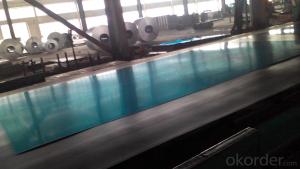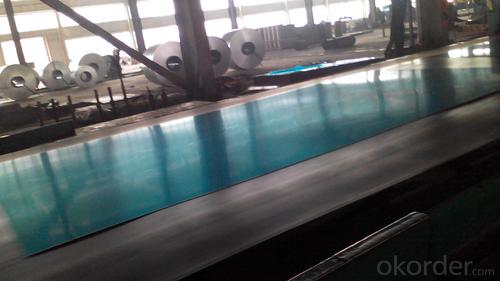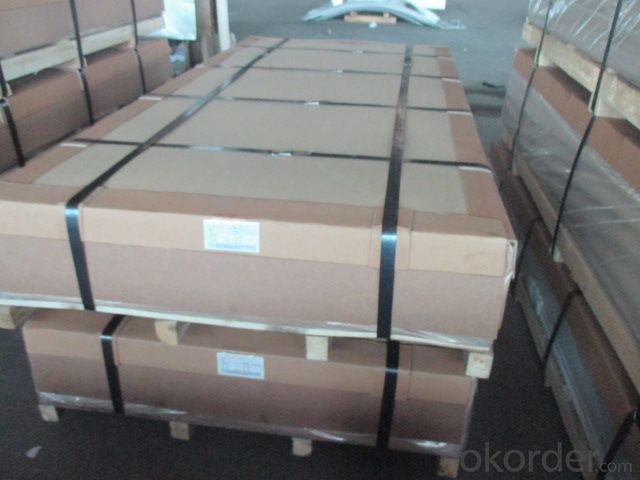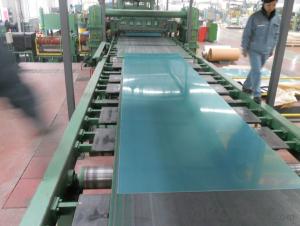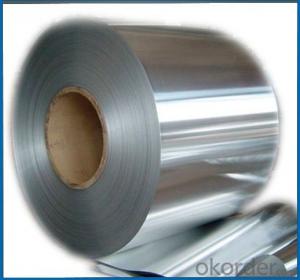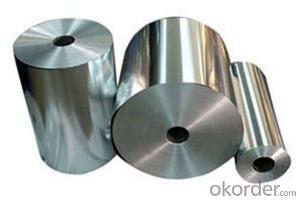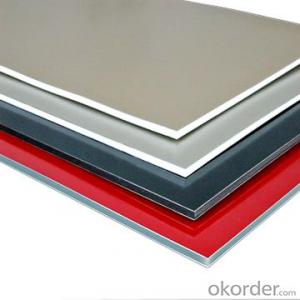EN AW - 2219 Aluminium Sheet With Transparent PE Film
- Loading Port:
- Shanghai
- Payment Terms:
- TT OR LC
- Min Order Qty:
- 5 m.t.
- Supply Capability:
- 1000 m.t./month
OKorder Service Pledge
OKorder Financial Service
You Might Also Like
Item specifice
1. Structure of EN AW - 2219 Aluminium Sheet With Transparent PE Film Description
EN AW - 2219 Aluminium Sheet With Transparent PE Film is one semi-finished aluminium material. This sheet can be rolled down to aluminium coil,sheet,circle ect. The alloy AA1050 is widly used in building, industry ect. Its weight is much lower than steel. So many customers choosed aluminium material instead of steel.
2. Specification of EN AW - 2219 Aluminium Sheet With Transparent PE Film
EN AW - 2219 Aluminium Sheet With Transparent PE Film | |
Main Specification | |
Alloy | AA1xxx (AA1050, AA1060, AA1070, AA1100 etc.) |
AA3xxx (AA3003, AA3004, AA3005, AA3105 etc.) | |
AA5xxx, AA6XXX (AA5052,AA5083, AA5754, AA6061, AA6062 etc.) | |
AA8xxx(AA8011, AA8006 etc.) | |
Temper | H14,H16, H18, H22, H24, H26, H32,O/F, T4, T6, T651 |
Thickmess | 0.01mm-100mm |
Width | 30mm-1700mm |
Standard | GB/T 3880-2006/ASTM |
Special specification is available on customer's requirement | |
3. Application of EN AW - 2219 Aluminium Sheet With Transparent PE Film
(1).Interior: wall cladding, ceilings, bathrooms, kitchens and balconies, shutters, doors...
(2).Exterior: wall cladding, facades, roofing, canopies, tunnels,column covers , renovations...
(3).Advertisement: display platforms, signboards, fascia, shop fronts...
4. Feature of EN AW - 2219 Aluminium Sheet With Transparent PE Film
Surfact Quality :
Be free from Oil Stain, Dent, Inclusion, Scratches, Stain, Oxide Dicoloration, Breaks, Corrosion, Roll Marks, Dirt Streaks and other defect which will interfere with use,
Mechenical Property:
Chemical Composite and Mechanical Property
5. Certificate of EN AW - 2219 Aluminium Sheet With Transparent PE Film
SGS and ROHS(if client request, paid by client), MTC(plant provided), Certificate of Origin(FORM A, FORM E, CO), Bureau Veritas and SGS (if client request, paid by client), CIQS certificate
6. Image of EN AW - 2219 Aluminium Sheet With Transparent PE Film
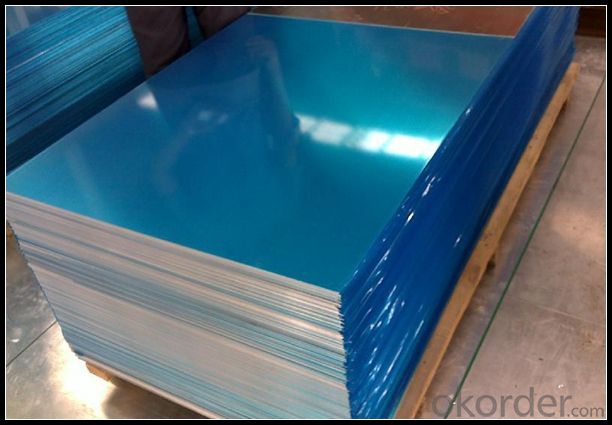
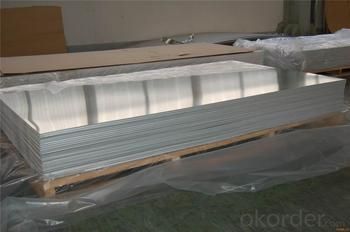
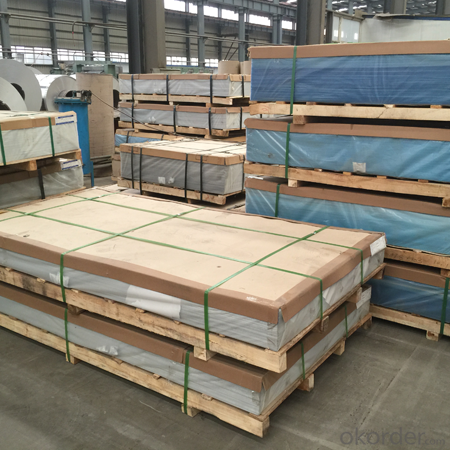
7. Package and shipping of EN AW - 2219 Aluminium Sheet With Transparent PE Film
First, plastic cloth with drying agent inside; Second, Pearl Wool ; Third, wooden cases with dry agent , fumigation wooden pallets, aluminum surface could cover blue PVC film
8. FAQ
1) What is the delivery time?
Depends on actual order, around 20 to 35 days
2) What is the QC system:
We have QC staff of 20 persons and advanced equipment, each production is with MTC traced from Aluminum ingot lot.
3) What market do you mainly sell to?
Australia, America, Asia, Middle East, Western Europe, Africa etc
- Q:What are the different types of aluminum alloy used in coil production?
- There are several different types of aluminum alloy used in coil production, each with its own unique properties and characteristics. Some of the most commonly used aluminum alloys in coil production include: 1. 1100 Aluminum Alloy: This type of alloy is known for its excellent corrosion resistance and high thermal and electrical conductivity. It is often used in applications where strength is not a primary concern, such as in food and beverage packaging. 2. 3003 Aluminum Alloy: This alloy is commonly used in coil production due to its moderate strength and good formability. It is often used in roofing and siding applications, as well as in the manufacture of HVAC components. 3. 5052 Aluminum Alloy: This alloy is known for its high strength and excellent corrosion resistance, making it ideal for use in marine and automotive applications. It also has good formability and is often used in the production of fuel tanks and body panels. 4. 6061 Aluminum Alloy: This alloy is a versatile and widely used aluminum alloy that offers a good balance of strength, formability, and corrosion resistance. It is commonly used in a variety of applications, including structural components, automotive parts, and aerospace components. 5. 7075 Aluminum Alloy: This alloy is known for its high strength-to-weight ratio and excellent fatigue resistance. It is often used in applications where strength and durability are critical, such as in the aerospace industry. These are just a few examples of the different types of aluminum alloys used in coil production. Each alloy has its own unique properties that make it suitable for specific applications, and manufacturers choose the appropriate alloy based on the desired characteristics of the final product.
- Q:What is the typical modulus of elasticity for aluminum coils?
- Aluminum coils typically have a modulus of elasticity of approximately 70 GPa (gigapascals) or 10 million psi (pounds per square inch). The modulus of elasticity gauges a material's inflexibility or capacity to withstand distortion under an external force. Aluminum is renowned for its impressive strength-to-weight proportion and remarkable elasticity, rendering it a favored option across diverse sectors such as automotive, aerospace, and construction. Nonetheless, it is noteworthy to acknowledge that the modulus of elasticity may slightly differ depending on the particular alloy and temper of the aluminum coil.
- Q:Can aluminum coils be used in power generation facilities?
- Yes, aluminum coils can be used in power generation facilities. Aluminum is a highly conductive material that offers several advantages for power generation applications. It has excellent thermal conductivity, meaning it can efficiently transfer heat away from the coils, which is crucial for cooling systems in power generation facilities. Additionally, aluminum is lightweight, making it easier to handle and install compared to other metals like copper. This lightweight property also reduces the overall weight of the equipment, resulting in cost savings. Furthermore, aluminum is corrosion-resistant, which is important for power generation facilities that often operate in harsh environments. Overall, aluminum coils are a viable option for power generation facilities due to their conductivity, thermal efficiency, lightweight nature, and corrosion resistance.
- Q:Are aluminum coils resistant to UV rays?
- Generally, aluminum coils possess resistance against UV rays. Aluminum, being a non-reactive metal, does not easily corrode or react with other substances. This resistance to corrosion also extends to UV rays. UV rays are a type of radiation emitted by the sun and can cause gradual damage to various materials, including fading, discoloration, and degradation. However, aluminum is renowned for its ability to withstand UV rays without significant harm. Hence, aluminum coils are an appropriate option for outdoor applications that involve exposure to sunlight and UV rays, such as air conditioning systems, refrigeration units, and solar panels. Furthermore, aluminum coils can be coated with protective finishes or paints to further enhance their resistance to UV rays and prolong their lifespan.
- Q:What are the vibration damping properties of aluminum coils?
- Aluminum coils have good vibration damping properties due to their inherent stiffness and damping capacity. The material's high density and low modulus of elasticity allow it to absorb and dissipate vibrations effectively, reducing the transmission of energy through the coil. This makes aluminum coils ideal for applications requiring vibration control and noise reduction.
- Q:How do aluminum coils contribute to the sound insulation of buildings?
- Aluminum coils contribute to the sound insulation of buildings through their unique properties and applications. Aluminum is a lightweight and flexible material that can be easily formed into coils, making it an ideal choice for sound insulation purposes. One of the main ways aluminum coils contribute to sound insulation is by acting as a barrier to prevent the transmission of sound waves. When installed in walls, ceilings, or floors, these coils create an additional layer that helps to block and absorb sound energy. Aluminum has a high density and rigidity, which allows it to effectively reflect and absorb sound waves, reducing their intensity as they pass through the building structure. Moreover, aluminum coils can be combined with other soundproofing materials, such as foam or fiberglass, to enhance their sound absorption capabilities. These combinations provide a more comprehensive sound insulation system, as the different materials work together to trap and dampen sound waves. Another advantage of aluminum coils is their resistance to moisture and corrosion, which makes them suitable for both indoor and outdoor applications. This durability ensures that the sound insulation provided by aluminum coils remains effective over time, even in harsh environments. Additionally, aluminum coils are easy to install and maintain, making them a cost-effective solution for sound insulation in buildings. Their lightweight nature allows for easy transportation and handling, while their flexibility enables them to be installed in various positions and configurations. In summary, aluminum coils contribute to the sound insulation of buildings by acting as a barrier to sound transmission, reflecting and absorbing sound waves, and providing durability and versatility. Their combination with other soundproofing materials further enhances their effectiveness. With their lightweight and flexible properties, aluminum coils offer a practical and cost-effective solution to improve the acoustic performance of buildings.
- Q:Can aluminum coils be used in the production of electronic devices?
- Yes, aluminum coils can be used in the production of electronic devices. Aluminum is a versatile and widely used material in various industries, including electronics. It possesses excellent electrical conductivity and thermal conductivity, making it suitable for use in electronic components such as coils and inductors. Aluminum coils are commonly used in power transformers, motors, generators, and other electronic devices where the transfer of electrical energy is necessary. Additionally, aluminum is lightweight, durable, and cost-effective, making it an attractive choice for manufacturers. However, it is important to note that the specific application and requirements of the electronic device will determine the suitability of aluminum coils.
- Q:What is the maximum coil weight that can be produced?
- The maximum coil weight that can be produced depends on various factors such as the type of material being coiled, the dimensions of the coil, and the capacity of the coiling equipment. Without specific details, it is difficult to provide an exact answer.
- Q:Can aluminum coils be used in heat sinks?
- Indeed, heat sinks can employ aluminum coils. Aluminum, renowned for its remarkable thermal conductivity, stands as a favored option for heat sinks. The prime purpose of these sinks is to avert overheating by expelling heat from electronic components and other devices. By incorporating aluminum coils into heat sinks, one can augment the surface area, thereby intensifying heat dissipation. The coils can assume diverse shapes and be arranged in different configurations to optimize cooling efficiency. Moreover, aluminum boasts not only being lightweight but also resistant to corrosion, rendering it a sensible and economical selection for heat sink applications.
- Q:What is the role of aluminum coils in HVAC systems?
- The role of aluminum coils in HVAC systems is crucial for the efficient functioning of the system. Aluminum coils are an essential component of the air conditioning unit as they are responsible for transferring heat between the indoor and outdoor environments. When the air conditioning unit is in cooling mode, the aluminum coils act as evaporator coils. They help in absorbing heat from the indoor air, thus cooling it down. The warm air from the room passes over the cold aluminum coils, and the heat is transferred to the refrigerant flowing through the coils. This process cools the air and removes moisture, resulting in the desired cooling effect. In heating mode, the aluminum coils function as condenser coils. They receive the hot refrigerant from the compressor and transfer the heat to the surrounding air. This hot air is then distributed throughout the building, providing warmth during colder weather. Aluminum coils are preferred in HVAC systems due to their excellent heat transfer properties and resistance to corrosion. They are lightweight, durable, and have a high thermal conductivity, allowing for efficient heat exchange. Moreover, aluminum coils are more environmentally friendly compared to other materials like copper, as they are easier to recycle. Regular maintenance and cleaning of the aluminum coils are necessary to ensure optimal performance and prevent any airflow restrictions caused by dust, dirt, or debris buildup. Neglecting coil maintenance can lead to reduced cooling or heating capacity, decreased energy efficiency, and potential system breakdowns. Overall, aluminum coils play a vital role in HVAC systems by facilitating the heat transfer process, enabling efficient and effective temperature control in both cooling and heating modes, and contributing to the overall comfort and functionality of the system.
1. Manufacturer Overview |
|
|---|---|
| Location | |
| Year Established | |
| Annual Output Value | |
| Main Markets | |
| Company Certifications | |
2. Manufacturer Certificates |
|
|---|---|
| a) Certification Name | |
| Range | |
| Reference | |
| Validity Period | |
3. Manufacturer Capability |
|
|---|---|
| a)Trade Capacity | |
| Nearest Port | |
| Export Percentage | |
| No.of Employees in Trade Department | |
| Language Spoken: | |
| b)Factory Information | |
| Factory Size: | |
| No. of Production Lines | |
| Contract Manufacturing | |
| Product Price Range | |
Send your message to us
EN AW - 2219 Aluminium Sheet With Transparent PE Film
- Loading Port:
- Shanghai
- Payment Terms:
- TT OR LC
- Min Order Qty:
- 5 m.t.
- Supply Capability:
- 1000 m.t./month
OKorder Service Pledge
OKorder Financial Service
Similar products
New products
Hot products
Hot Searches
Related keywords
